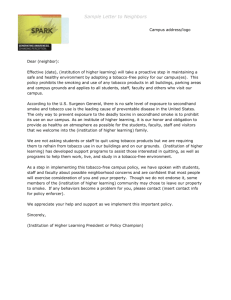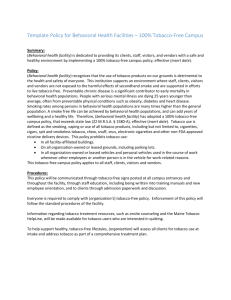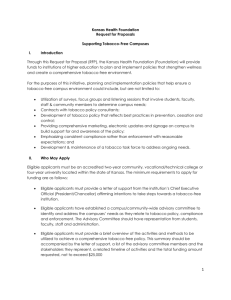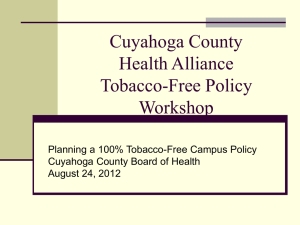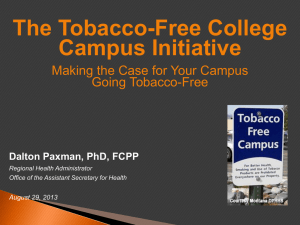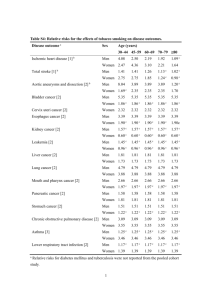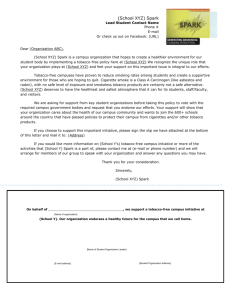Tobacco-free a grassroots approach
advertisement
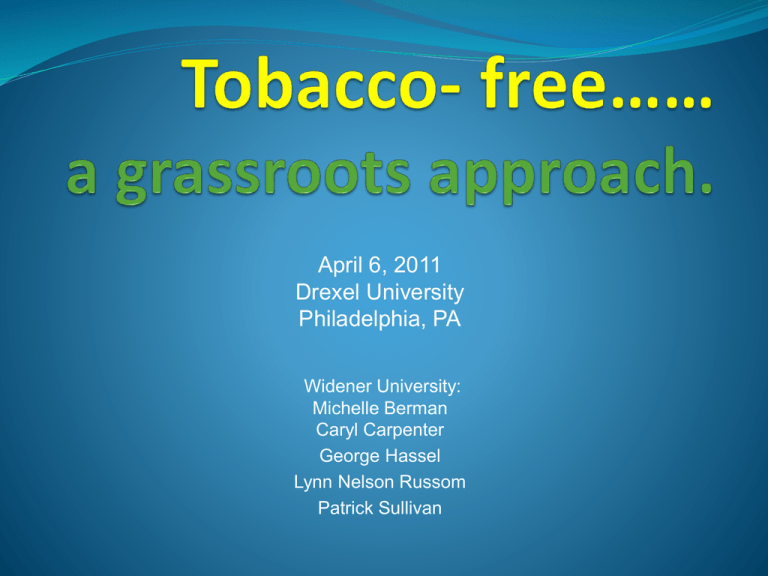
April 6, 2011 Drexel University Philadelphia, PA Widener University: Michelle Berman Caryl Carpenter George Hassel Lynn Nelson Russom Patrick Sullivan Learning Objectives: 1. Identify methods and venues to initiate conversations to achieve a “tobacco-free” campus climate. 2. List campus constituents that are needed to support a tobacco-free initiative. 3. Explore strategies for acceptance and implementation (resources) for a successful, healthy initiative. 4. Discuss enforcement and follow-up of new tobacco-free policy. • Doctorate-granting, metropolitan university that combines academic quality with career preparation and a commitment to community service. • Liberal arts and sciences and professional programs leading to associate’s, baccalaureate, master’s and doctoral degrees. • Campuses: Chester, Exton, and Harrisburg, Pennsylvania, and Wilmington, Delaware • 6,500 students Wellness Advocacy Committee “Healthy Heart” Purpose Membership Funding Programming Educational: Nutrition Stress Management Health Information IBC Speakers Smoking Cessation Exercise: Walks, aerobics, Pilates, yoga Screening: Wellness (BP,BMI, Glucose, etc.) Communications Web Fax Email What are the risks of smoking? Leading “preventable” cause of disease and premature death. (Surgeon General Report, The Health Consequences of Smoking, 2004) Smoking causes more than 85% of lung cancers and can cause cancer almost anywhere in the body. One in three cancer deaths in the U.S. is tobacco-related. (Center for Disease Control, 2010) Brief exposure to secondhand smoke can cause cardiovascular disease and could trigger acute cardiac events, such as heart attack. (Center for Disease Control, 2010) CDC – Current Smoker Statistics 20% - adults - 18 years of age and old - cigarette smokers 22% - report as former smokers 58% - report - never smoked Adults (bachelor’s degree education) ** less likely to smoke AND more likely to have never smoked ( CDC Summary Health Statistics for U.S. Adults: National Health Interview Survey, 2008, Series 10, Number 242 December 2009) Quick Statistics…… 443,00 deaths each year 50% secondhand smoke responsible for 50,000 of those deaths 50 % of long-term smokers die prematurely ( ENDING THE TOBACCO EPIDEMIC: A Tobacco Control Strategic Action Plan for the U.S. Department of Health and Human Services, 2010) Healthy People 2010 now 2020 tobacco control objectives: Reduce tobacco use by adults and adolescents. Reduce the initiation of tobacco use among children, adolescents, and young adults. Increase successful cessation attempts by smokers. Reduce the proportion of nonsmokers exposed to secondhand smoke. Pennsylvania Law Clean Indoor Air Act (Senate Bill 246) Prohibits smoking in most public areas and workplaces, protecting the majority of citizens in Pennsylvania from tobacco smoke. September 10, 2008 **Smoking is unrestricted in establishments that report less than 20% food sales. However, no one under 18 may enter the premises, even momentarily, and appropriate signage must be posted. National legislation June 22, 2009,President Obama signed into law historic legislation granting the U.S. Food and Drug Administration (FDA) authority to regulate tobacco products to protect the public health. March 23, 2010, President Obama signed into law historic health insurance reform legislation, the Patient Protection and Affordable Care Act (Affordable Care Act). - Prevention and Public Health Fund – FDA Regulation of Tobacco Family Smoking Prevention and Tobacco Control Act (H.R.1256) Signed into Law - June 22, 2009 BANS: Candy Flavored cigarettes Tobacco Co. logos at sporting events or on clothing Tobacco ads near schools or playgrounds Companies from promoting products as lower-risk alternatives to traditional tobacco REQUIRES: Food and Drug Administration (FDA) power to regulate tobacco products No “light” or “low tar” labels Larger warning labels on cigarette packaging Tobacco Free Initiative Grassroots inquiries White Paper/Research Presentations (Executive, SLT, Board of Trustees, Town Hall) Pre- July 1, 2010 Implementation Process (Phase 1) Grassroots Inquiries - faculty - staff -students Tobacco Free - White Paper (providing an overview of the rationale for a tobacco-free campus climate) Graduate Intern = Research (senior science policy analyst) Presentation to subcommittee, Senior Leadership Team, President and Board of Trustees College Campuses Cigarettes, Cigars Hookahs or waterpipes 1 Hookah session = 100 cigarettes 1 Cigar = 1 pack of cigarettes (World Health Organization, 2005) Smokeless Tobacco (National Cancer Institute, 2009) Planning Strategies Communicate the announcement, policy and resources to all Widener University faculty, staff, students and contractors. Raise awareness through a variety of methods, including very visible posted signs throughout the campus. Train members of the University community regarding the policy procedures, enforcement, and resource options and availability. Implement the policy in a caring way by offering resources, such as tobacco cessation, exercise and health awareness programs. Make enforcement the shared responsibility of all Widener University faculty, staff and students by encouraging others to comply and respectfully bringing any violation of this policy to the awareness of the person or persons observed violating the policy. Tobacco-Free Policy who - all university faculty, staff, students, visitors, contractors and guests when - at all times and the use of tobacco, including smoking where - prohibited within “university boundaries” university facilities, outdoor areas, and university owned vehicles Activities Time Frame Who is Responsible? Funding President Harris’ announcement of the commitment to create a tobaccofree environment - with Final Policy May 2009 President Harris No Present and circulate the policy proposal to University groups and constituents for suggestions and modifications to identify any potential problems before the policy is finalized May 2009 Representatives of Wellness Committee No Incorporate into new student orientations June 2009 Health Services Director No Incorporate into new hire orientations June 2009 HR No Social Marketing campaign development targeting student’s smoking behavior – Survey and draft plan Summer 2009 Wellness Committee Yes Social Marketing campaign development targeting employee’s smoking behavior – Survey and draft plan Summer 2009 Wellness Committee Yes Webpage with policy, resources offered, resource links, contact for feedback August 2009 HR Yes Official President Harris memo - with Final Policy, resources, webpage September 2009 Wellness Committee/HR? No Personalized email stating the change in smoking policy, effective date and webpage for employees September 2009 HR No Personalized email stating the change in smoking policy, effective date and webpage for students September 2009 President, Provost, Dean of Student Affairs ? No Train supervisors and university members to communicate the policy, promote awareness of policy and enforcement procedures Fall 2009 HR Yes Pocket sized cards to hand to Widener Community stating the change in smoking policy, effective date and webpage September 2009 Wellness Committee/HR Yes Electronic banner in University Center with effective date and webpage September 2009 Health Services Director No Large informational board in Wellness Center announcing exercise class options, education September 2009 Wellness Center Yes LED board outside of Metropolitan Hall (effective date and webpage posted) September 2009 Health Services Director No TV system in University Center (effective date and webpage posted) September 2009 Health Services Director No Signs posted throughout the campus strategically located – in front of University Center, Library, Wellness Center September 2009 HR Yes Smoking cessation class on campus September 2009 IBC Yes Public Service Announcement September 2009 Multiple Options No LLPD program with smoking focus September/ October 2009 IBC Yes Social Marketing campaign implementation October 2009 Wellness Committee Yes Table tents in dining hall to educate about the policy and obtain resources – part of social marketing campaign October 2009 Wellness Committee/HR Yes Great American Smokeout Program November 19, 2009 IBC Yes Smoking cessation class on campus January 2010 IBC Yes LLPD program with smoking focus February 2010 IBC Yes Student handbooks - updated to reflect policy change Effective July 1, 2010 Student Services No Employee handbooks - updated to reflect policy change Effective July 1, 2010 HR No Policy manuals - updated to reflect policy change Effective July 1, 2010 HR No September 11, 2009 University Memorandum Series 8 - #1b Tobacco-Free Policy (Students) In order to promote a healthy environment for students, faculty, staff, and visitors, Widener University will become tobacco-free, effective July 1, 2010 on all four campuses. The Tobacco-Free Policy will apply to all university faculty, staff, students, visitors, contractors and guests at all times and the use of tobacco, including smoking, will be prohibited within university facilities, outdoor areas, and university owned vehicles. Although this initiative is new for Widener, we will be following the lead of many colleges and universities throughout the nation whose campuses are currently tobacco-free. The purpose of announcing the Tobacco-Free Policy several months in advance of implementation is to give everyone ample opportunity to adjust to these restrictions, while facilitating a smooth transition to a tobacco-free environment. To assist in the adjustment process, the university will make available current information regarding resources to assist those who want to quit smoking or those who wish to support someone in their effort to quit. Student Health Services will offer students both educational programming and patient care/individual counseling appointments for options in smoking cessation. In late September, look for more information on Campus Cruiser and the Tobacco-Free website regarding the Tobacco-Free Policy and current information about resources for students. I look forward to all of us enjoying the enhanced health benefits of a tobacco-free campus. James T. Harris III, D.Ed. President September 11, 2009 University Memorandum Series 8 - #1a Tobacco-Free Policy (Faculty and Staff) In order to promote a healthy environment for students, faculty, staff, and visitors, Widener University will become tobacco-free, effective July 1, 2010 on all four campuses. The Tobacco-Free Policy will apply to all university faculty, staff, students, visitors, contractors and guests at all times and the use of tobacco, including smoking, will be prohibited within university facilities, outdoor areas, and university owned vehicles. Although this initiative is new for Widener, we will be following the lead of many colleges and universities throughout the nation whose campuses are currently tobacco-free. The purpose of announcing the Tobacco-Free Policy several months in advance of implementation is to give everyone ample opportunity to adjust to these restrictions, while facilitating a smooth transition to a tobacco-free environment. To assist in the adjustment process, the university will make available current information regarding resources to assist those who want to quit smoking or those who wish to support someone in their effort to quit. Updated information regarding the Tobacco-Free Policy and current resources available to assist Widener employees will be posted on the Tobacco-Free website when it is operational in late September. In the interim, the Widener University Wellness Committee will e-mail resource information to all university employees. I look forward to all of us enjoying the enhanced health benefits of a tobacco-free campus. James T. Harris III, D.Ed. President University Policy Campus Champions Cessation Programs Healthful Links www.widener.edu/tobaccofree/ American College Health Association (Position Paper 9/09) ACHA –NCHA II Reference Group Executive Summary Spring 2010 - 95,712 respondents ACHA-NCHA - nationally recognized research survey that provides precise data about students’ health habits, behaviors, and perceptions. Spring 2010 - tobacco-related responses: 84% of college students described themselves as non-smokers 91.2% reported being non-smokers for hookah/water pipes 86.2% described themselves as non-users of smokeless tobacco (never used or have not used in the last 30 days) COLLEGES AND UNIVERSITIES WITH 100% TOBACCO-FREE CAMPUS POLICIES Updated January 2011 259 colleges and universities prohibiting smoking and all forms of tobacco use everywhere on campus http://www.lungoregon.org/tobacco/pdf_word_doc/TobaccoFree_Colleges_and_Universities_100.pdf U.S. Colleges and Universities with Smokefree Policies April 1, 2011 501 - 100% smokefree campuses with no exemptions http://www.no-smoke.org/pdf/smokefreecollegesuniversities.pdf What Widener Offers… One-on-one cessation counseling Nicotine Replacement – patches/gum Education Biofeedback Free Smoking Cessation Programs Spring Semester (announcement sample) Open to all students, faculty and staff One-on-one weekly cessation coaching with free nicotine replacement provided by the Wellness Connection February 8th through March 22nd (No meeting week of March 1st) Mondays 10:00 am to 2:00 pm Individually scheduled appointments: Student Health Services Conference Room To register go to www.connect2wellness.com to schedule your individual sessions or call 800-2002229. Student Smoking Cessation Group with free nicotine replacement provided by Student Health Services February 8th through March 22nd (No meeting the week of March 1st) Mondays 6:30 pm to 7:30 pm Student Health Services Conference Room To register send an email to studenthealth@mail.widener.edu. Provide your name and cell number for a return confirmation call. Enforcement 1) The university administration is responsible for coordinating the implementation plan. (Phase 2) 2) Enforcement of the policy will depend on the respect and cooperation of all Widener University faculty, staff and students adhering to and enforcing the policy. Campus Safety (policy) Campus Safety staff will give a copy of the Tobacco-Free card to visitors using tobacco on university property and ask them to extinguish cigarettes, cigars or pipes or dispose of smokeless tobacco products. If a visitor refuses to comply with this request, Campus Safety staff may ask the visitor to leave campus (as is currently done when visitors violate the university’s alcohol and drug policy). In extreme cases, Campus Safety staff may request enforcement by the Chester, Wilmington, Harrisburg or Exton police. Enforcement The first offense will result in an incident report but no fine Subsequent offenses will result in fines as follows: For Students: $25 for the second offense $50 for the third or any subsequent offenses Fines will be directly applied to student accounts and will result in a “hold” on a student’s account for non-payment of the fine. A fourth offense will also result in Suspension from Widener University. For Faculty and Staff: $25 for the second offense $50 for the third or any subsequent offenses Copies of the incident reports will be sent to an employee’s supervisor or a faculty member’s dean and the fine will be charged to the employee’s account. Infractions (as of 4.1.11) Students – 3 incident reports/ judicial Faculty/Staff – 0 Evaluation and Feedback Mechanism for allowing employee feedback during the transition period. The implementation should be monitored for effectiveness Permits altering implementation and allows reporting to management and employees about the impact of the policy. Assess policy effectiveness, 3 months post July 10, 2010: Compliance with the policy Utilization of smoking cessation support Problems encountered by management Evaluate the policy over the longer term: Awareness of the policy and smoking cessation activities Utilization of and participation in smoking cessation activities Effectiveness of smoking cessation activities Possible Challenges a. Lack of awareness of policy b. Non-compliance c. Unsuccessful enforcement d. Smoking on city-owned sidewalks “Spitting in the Wind” Jeff Cooper Athletic Trainer Monday, April 12, 2010 Lathem Hall 7:30 PM The Franklin Institute The Great American Smokeout November 18, 2010 Planning Questions: When will the new policy be implemented? Who will the policy apply to? What will the tobacco-free policy prohibit? What else is included in the policy? Where will the policy apply to? Can an individual smoke in his/her personal car? Which committee made this tobacco-free policy recommendation? Why the change in tobacco policy now? What are other colleges and universities doing? Will there be any designated smoking areas for employees, students and visitors? Why is the tobacco-free policy being announced over a year in advance of when the policy will be implemented? How will this policy be implemented Which committee made this tobacco-free policy recommendation? Why the change in tobacco policy now? What are other colleges and universities doing? Will there be any designated smoking areas for employees, students and visitors? Why is the tobacco-free policy being announced over a year in advance of when the policy will be implemented? How will this policy be implemented? What resources will be available to help employees and students with the transition? What should an employee or student do who sees a fellow employee or student using tobacco and violating the tobacco-free policy? How will the new tobacco-free policy be enforced? What are the options available to University members that are not planning or prepared to quit? Thank you
